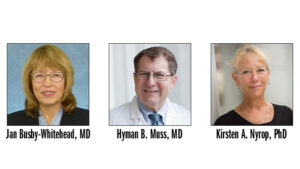
On December 2nd, 2022, from 10:00 am- 4:30 pm, the UNC Geriatric Oncology Symposium: Cancer and Aging will be taking place. The symposium will have the options of virtual or in person options. Topics being discussed this year are treatment adherence and side effects, body composition, disparities, fellow and resident research, and biomarkers of aging.
In light of this year’s symposium, we interviewed Kirsten A. Nyrop, PhD, UNC-Chapel Hill Associate Professor, and Deputy Director for Research, Geriatric Oncology Program for more information and insight on this year’s event.
What is the importance of symposiums like the Geriatric Oncology Research Symposium?
For the co-directors of the Geriatric Oncology Program (now the Cancer and Aging Program) of the UNC Lineberger Comprehensive Cancer – Hyman Muss, MD (Oncology) and Jan Busby-Whitehead, MD [NKA1] (Geriatrics) – this annual symposium provides an opportunity to showcase and share the wide variety of topics and disciplines within the rubric of “cancer and aging” research. The symposium agenda includes UNC faculty, fellows, medical students, and doctoral students, as well as colleagues from outside UNC. It is a very collegial atmosphere. The agenda is fast-paced – 5 or 10 minute presentations – which may seem hectic but is actually fun and highly informative. Something for everyone!
What are some common misconceptions about Geriatric Oncology?
Cancer is largely a disease of aging … our risk for cancer increases with age due to certain aspects of the aging process, in addition to genetic, environmental and health behavior factors. The average age at diagnosis – depending on the cancer site – is in the 60’s, which is by no means “old”. But this is an age where other chronic conditions become more prevalent and there may be additional frailty considerations. The great heterogeneity of our older adult population is reflected in the wide range of “fitness for treatment” we see in older adults with cancer – with some elderly persons being very fit and others less so. This needs to be assessed for each individual patients, rather than simply assuming that all people of a certain age are “geriatric”.
Do you find that Geriatric Oncology Research is a growing field of study? If yes, how so?
It depends on how broadly you define cancer and aging research. For example, there is growing recognition of the importance of including older persons in clinical trials, because their toxicity profiles may differ in important ways from those of younger study participants. And there is a very active Cancer and Aging Research Group (CARG) that focuses on aging research and cancer. In addition, the American Society of Clinical Oncology (ASCO) has provided support and educational opportunities aimed at improving cancer care in older patients. Geriatric Oncology is still a relatively small community of researchers who self-identify as focused on cancer and aging, but in fact a lot of research – from basic to translational – pertains to the care and quality of life of older persons with cancer. It is also encouraging to have so many medical students on the symposium program, many of them funded through Dr. Busby-Whitehead’s T35 Medical Student Training in Aging Research (MSTAR) program.
What is the difference between a Geriatric Cancer diagnosis and that of someone who is younger.
That is hard to generalize but the major difference is that older patients frequently have other major health issues in addition to their cancer diagnosis. This makes care of many of these patients extremely challenging.
Does it cost more to treat cancer in older patients? If so, what are the ratios?
Cost of care for all patients depends on the treatment plan and are more extensive depending on tumor stage and phenotype. What is of added concern for all age groups is quality of life after primary treatment, which may entail supportive care services for older patients because the disease and/or treatment lowered their reserves and functional status.
What are you looking forward to the most about this year’s Symposium? Are there any topics you in particular are looking forward to in this year’s symposium?
It is very exciting for Dr. Ned Sharpless to participate (at 3pm) as our Plenary Speaker, and Dr. Shelley Earp will provide welcoming remarks. Dr. Sharpless is well-known to everyone as the former Director of UNC Lineberger and the immediate past Director of the National Cancer Institute. He has had a long-standing interest in biomarkers of aging and cancer – specifically the biomarker p16INK4a, a key gene related to aging – which is an area of interest for a number of our symposium panelists.
Is there any additional information you would like to share about this year’s Geriatric Oncology Research Symposium?
This year’s symposium will be a hybrid format, with the opportunity to attend-in person – at the Rizzo Center in Chapel Hill – or remotely via zoom. The forum had always been in-person, but Covid-19 required all gatherings to be remote for the past several years. We are excited about having the in-person option this year. In-person attendance is always fun because it provides opportunities for direct interactions among attendees … as well as excellent refreshments throughout the day. But zoom is also a great option, especially for interested people throughout the state who cannot come to Chapel Hill or can only participate during limited times throughout the day. We hope people register and join us on December 2. The symposium as always is open to the public.
We thank Dr. Nyrop and Co Directors Hyman Muss, MD (Oncology) and Jan Busby-Whitehead, MD [NKA1] (Geriatrics) for the work they are doing within the geriatric community!
Please click here to learn more and register for this year’s symposium
You can also view this year’s topics and schedules here